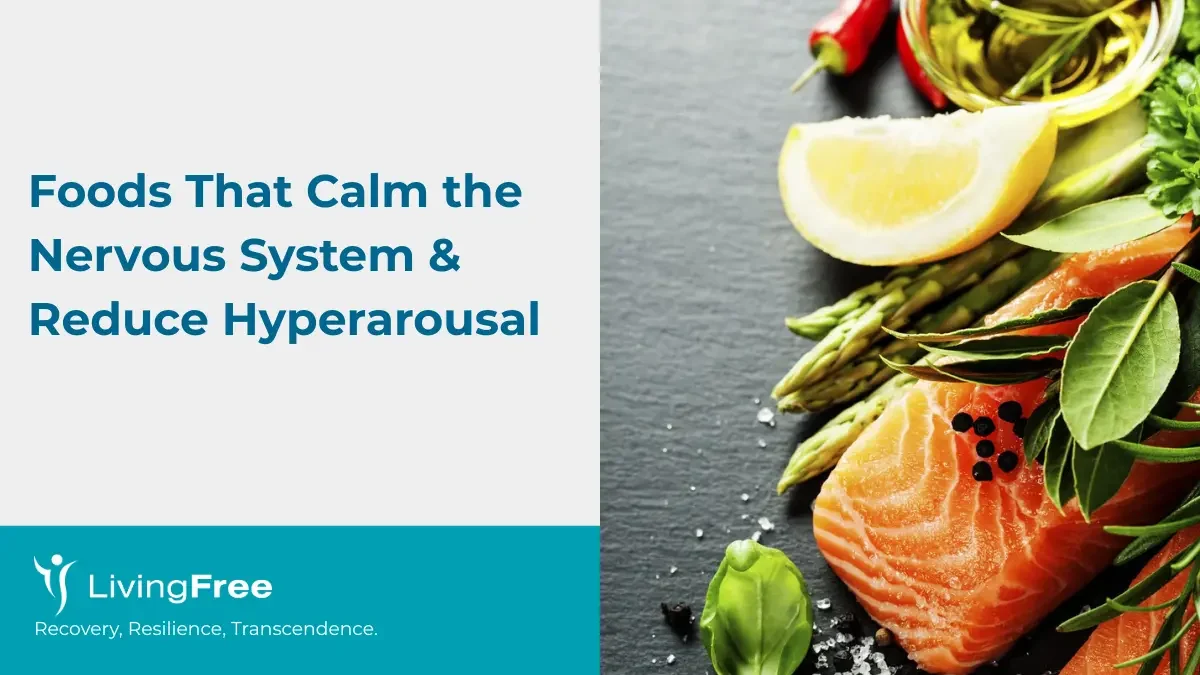When your nervous system feels stuck in overdrive, such as: racing heart, restlessness, light sleep, jumpiness, it’s often because your body is trapped in a state of hyperarousal. While therapy, movement, and sleep hygiene remain foundational tools, what you eat can significantly influence how your brain and body regulate stress.
This article combines insights to give you the most complete guide on foods that help calm the nervous system & reduce hyperarousal, and also the foods you should avoid.
Understanding the Connection: Nervous System, Anxiety, and Hyperarousal
Before diving into foods that calm the nervous system & reduce hyperarousal, it’s essential to understand why food can influence the body’s arousal levels.
Your nervous system has two major branches:
- Sympathetic (Fight/Flight): increases heart rate, vigilance, and tension.
- Parasympathetic (Rest/Digest): slows the body down and promotes calm.
When someone experiences chronic stress or anxiety, the sympathetic system becomes overactivated, creating hyperarousal, a state where the body struggles to switch back to calm. Symptoms include:
- Difficulty sleeping or insomnia.
- Heightened startle response.
- Racing thoughts.
- Muscle tension.
- Rapid heartbeat.
Nutrition regulates several biological systems directly involved in this process:
- Neurotransmitter production (serotonin, GABA) depends on amino acids, vitamins, and minerals from food.
- Blood sugar stability influences adrenaline and cortisol spikes.
- Gut microbiome health (through fermented foods and fiber) affects the vagus nerve, which helps regulate anxiety.
- Inflammation levels influence neural excitability and stress responses.
This is why certain foods help calm the nervous system, and why others intensify hyperarousal.
How Food Helps Regulate Stress & Anxiety
Key mechanisms include:
- Omega-3 fatty acids reduce neuroinflammation and modulate stress hormones.
- Magnesium supports GABA receptors (your brain’s main calming chemical). Low magnesium is strongly linked to higher anxiety.
- Tryptophan-containing foods support serotonin production when paired with carbohydrates.
- Probiotics & fermented foods influence gut–brain communication and may reduce anxiety scores.
- Stable blood sugar reduces nervous-system overstimulation and prevents cortisol/adrenaline spikes.
These foundations help explain why the following foods repeatedly appear in scientific reviews and expert guidelines.
Top Foods That Calm the Nervous System
Below are foods consistently recommended by nutrition experts and research-based articles for reducing hyperarousal and supporting emotional regulation.
1. Fatty Fish (Salmon, Mackerel, Sardines)
Rich in EPA/DHA, which reduce inflammation and modulate stress response systems. Helpful for lowering the intensity of anxiety symptoms.
2. Leafy Greens (Spinach, Kale, Swiss Chard)
Packed with magnesium and folate: both essential for neurotransmitter balance and nervous-system relaxation.
3. Nuts & Seeds (Pumpkin Seeds, Almonds, Walnuts, Chia)
High in magnesium, zinc, and tryptophan. Excellent for stabilizing blood sugar and supporting calmness.
4. Fermented Foods (Yogurt, Kefir, Kimchi, Sauerkraut)
Improve gut microbiota composition and reduce stress-induced inflammation, improving resilience to anxiety.
5. Complex Carbohydrates (Oats, Brown Rice, Quinoa)
Promote steady energy and assist serotonin production when paired with protein. Prevent spikes that can mimic panic.
6. Eggs, Turkey, Lean Proteins
Provide tryptophan and B vitamins needed to produce calming neurotransmitters like serotonin.
7. Berries & Vitamin C Fruit
Antioxidants reduce oxidative stress and help regulate cortisol patterns.
8. Herbal Teas & L-Theanine Sources (Chamomile, Green Tea, Matcha)
Chamomile contains apigenin, a natural calming compound; matcha provides L-theanine for focused relaxation.
9. Olive Oil & Avocados
Support brain function and reduce inflammation as part of a Mediterranean-style diet.
10. Dark Chocolate (70%+)
Rich in magnesium and flavonoids that may subtly enhance mood and relaxation. Portion control is key.
Foods That Make Hyperarousal Worse
Just as some foods support calm, others overstimulate the nervous system, spike cortisol, or trigger inflammation: all of which worsen hyperarousal symptoms.
1. Caffeine (Coffee, Energy Drinks, Strong Tea)
Increases adrenaline and can trigger panic-like sensations. Late-day caffeine disrupts sleep and increases nighttime hyperarousal.
2. High-Sugar & Refined Carbohydrates (Candy, Pastries, Sugary Drinks)
Causing rapid blood sugar spikes and crashes, leading to jitteriness and irritability.
3. Alcohol
Feels relaxing initially, but increases anxiety and disrupts sleep cycles, worsening next-day hyperarousal.
4. Ultra-Processed Foods (Fast Food, Packaged Snacks)
High in additives, unhealthy fats, and low-quality oils associated with inflammation and mood dysregulation.
5. Artificial Sweeteners (Aspartame, Sucralose)
Some individuals report increased anxiety or headaches; research suggests possible neurotransmitter disruptions.
6. Excess Salt
Can elevate blood pressure and heart rate, both amplify hyperarousal sensations.
A Gentle reminder Before You Go
Food can significantly influence how your nervous system functions, but it’s not a standalone solution for severe anxiety or trauma-related hyperarousal.
Studies show:
- Omega-3 fatty acids can help improves anxiety symptoms in many participants.
- Magnesium supplementation can reduce stress and subjective anxiety.
- Probiotic strains can reduce anxiety in specific contexts.
But these effects are supportive, not curative. Diet works best alongside therapy, breathwork, medication (if needed), sleep, and movement. What you’re experiencing is valid, and support is always within reach. If you need clarity, comfort, or a plan that fits your healing journey, you can contact us. You don’t have to carry this alone.
Related Reading:


